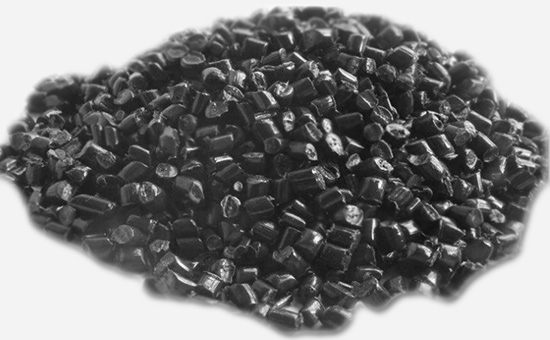
Polyvinyl chloride, or PVC, is one of the most common plastic products. It can be used with tread reclaimed rubber to produce thermoplastic elastomers. The process conditions for the preparation of tread reclaimed rubber/PVC blends, and the blending ratio of tread reclaimed rubber to PVC The type and amount of the compounding agent will affect the comprehensive performance of the thermoplastic blended elastomer. The compatibilizer is a common compounding agent used by rubber and plastic products processing companies to improve various mechanical indicators of the tread reclaimed rubber/PVC blend material.
The compatibilizer is a compounding agent that promotes the combination of two incompatible polymers to obtain a stable blend by means of the intermolecular bonding force; the reclaimed tread rubber is a rubbery characteristic made from the tread of waste tires. PVC is a white powder with an amorphous structure with a small degree of branching. The reclaimed rubber of the two blends will exist in the rubber phase, the polyvinyl chloride will exist in the plastic phase, and the compatibilizer will adjust The important compounding agent in the blending state of the two improves the compatibility among the components and strengthens the interaction among the phases. Its type and amount directly affect the performance of the tread reclaimed rubber/PVC blend material.
1. Types of compatibilizers in tread reclaimed rubber/PVC blend materials
If no compatibilizer is added, the mechanical properties and elasticity of the blended materials prepared by using tread reclaimed rubber and PVC are relatively poor. CR, CPE, and NBR are all candidate compatibilizers, which can significantly improve the tread The tensile strength and tear strength of reclaimed rubber/PVC blends. Studies have shown that the use of NBR such as NBR-18, NBR-26, and NBR-41 as compatibilizers for tread reclaimed rubber/PVC blends can better improve the properties of the blends.
2. The amount of compatibilizer in the tread reclaimed rubber/PVC blend material
The mechanical properties of tread reclaimed rubber/PVC blends will continue to improve with the increase in the amount of compatibilizer, but too much use will cause the mechanical properties of the blend to decrease, and it is best to control it among 4-10 parts. The best value is obtained through experiments; in the actual preparation process, the compatibilizing effect of the compatibilizer in the tread reclaimed rubber/PVC is related to the ratio of the tread reclaimed rubber to PVC, and the same amount of compatibilizer is in the more PVC content. The compatibilization effect in blended materials is better.
The blended material made by rubber-plastic blending has the dual characteristics of rubber and plastic, and can achieve complementary performance. It is a "polymer alloy" in the current manufacturing industry. It is a new type of high-performance compound prepared by blending reclaimed tread rubber with polyvinyl chloride. Molecular materials can be used in all walks of life. It can not only improve product performance, but also reduce production costs, reduce environmental pollution caused by waste tires, and further improve the performance of tread reclaimed rubber/PVC blends and expand the scope of use. Important research that benefits both the economy and the environment.
It seems that the tread reclaimed rubber can not only be used in the production of rubber products to reduce the cost of raw materials, but also has a broader world.
Exclusive original article [commercial authorization] reprint, excerpt and excerpt in any form are prohibited without written authorization. Focus on Hongyun rubber: learn the process formula and raw material technology of producing rubber products from recycled rubber to help you reduce costs and increase profits